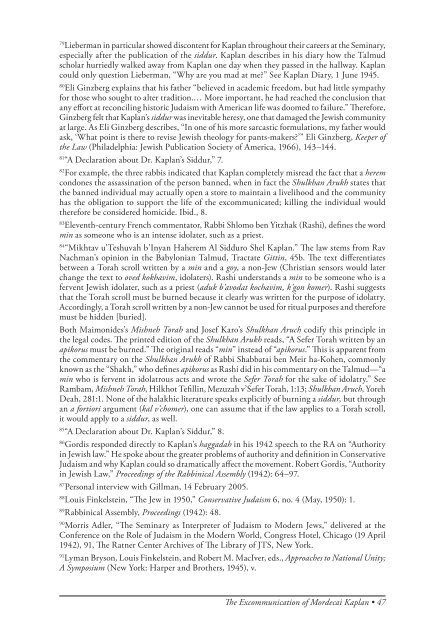American Jewish Archives Journal
American Jewish Archives Journal
American Jewish Archives Journal
You also want an ePaper? Increase the reach of your titles
YUMPU automatically turns print PDFs into web optimized ePapers that Google loves.
79Lieberman in particular showed discontent for Kaplan throughout their careers at the Seminary,<br />
especially after the publication of the siddur. Kaplan describes in his diary how the Talmud<br />
scholar hurriedly walked away from Kaplan one day when they passed in the hallway. Kaplan<br />
could only question Lieberman, “Why are you mad at me?” See Kaplan Diary, 1 June 1945.<br />
80Eli Ginzberg explains that his father “believed in academic freedom, but had little sympathy<br />
for those who sought to alter tradition.… More important, he had reached the conclusion that<br />
any effort at reconciling historic Judaism with <strong>American</strong> life was doomed to failure.” Therefore,<br />
Ginzberg felt that Kaplan’s siddur was inevitable heresy, one that damaged the <strong>Jewish</strong> community<br />
at large. As Eli Ginzberg describes, “In one of his more sarcastic formulations, my father would<br />
ask, ‘What point is there to revise <strong>Jewish</strong> theology for pants-makers?’” Eli Ginzberg, Keeper of<br />
the Law (Philadelphia: <strong>Jewish</strong> Publication Society of America, 1966), 143–144.<br />
81 “A Declaration about Dr. Kaplan’s Siddur,” 7.<br />
82For example, the three rabbis indicated that Kaplan completely misread the fact that a herem<br />
condones the assassination of the person banned, when in fact the Shulkhan Arukh states that<br />
the banned individual may actually open a store to maintain a livelihood and the community<br />
has the obligation to support the life of the excommunicated; killing the individual would<br />
therefore be considered homicide. Ibid., 8.<br />
83Eleventh-century French commentator, Rabbi Shlomo ben Yitzhak (Rashi), defines the word<br />
min as someone who is an intense idolater, such as a priest.<br />
84 “Mikhtav u’Teshuvah b’Inyan Haherem Al Sidduro Shel Kaplan.” The law stems from Rav<br />
Nachman’s opinion in the Babylonian Talmud, Tractate Gittin, 45b. The text differentiates<br />
between a Torah scroll written by a min and a goy, a non-Jew (Christian sensors would later<br />
change the text to oved kokhavim, idolaters). Rashi understands a min to be someone who is a<br />
fervent <strong>Jewish</strong> idolater, such as a priest (aduk b’avodat kochavim, k’gon komer). Rashi suggests<br />
that the Torah scroll must be burned because it clearly was written for the purpose of idolatry.<br />
Accordingly, a Torah scroll written by a non-Jew cannot be used for ritual purposes and therefore<br />
must be hidden [buried].<br />
Both Maimonides’s Mishneh Torah and Josef Karo’s Shulkhan Aruch codify this principle in<br />
the legal codes. The printed edition of the Shulkhan Arukh reads, “A Sefer Torah written by an<br />
apikorus must be burned.” The original reads “min” instead of “apikorus.” This is apparent from<br />
the commentary on the Shulkhan Arukh of Rabbi Shabbatai ben Meir ha-Kohen, commonly<br />
known as the “Shakh,” who defines apikorus as Rashi did in his commentary on the Talmud—“a<br />
min who is fervent in idolatrous acts and wrote the Sefer Torah for the sake of idolatry.” See<br />
Rambam, Mishneh Torah, Hilkhot Tefillin, Mezuzah v’Sefer Torah, 1:13; Shulkhan Aruch, Yoreh<br />
Deah, 281:1. None of the halakhic literature speaks explicitly of burning a siddur, but through<br />
an a fortiori argument (kal v’chomer), one can assume that if the law applies to a Torah scroll,<br />
it would apply to a siddur, as well.<br />
85 “A Declaration about Dr. Kaplan’s Siddur,” 8.<br />
86Gordis responded directly to Kaplan’s haggadah in his 1942 speech to the RA on “Authority<br />
in <strong>Jewish</strong> law.” He spoke about the greater problems of authority and definition in Conservative<br />
Judaism and why Kaplan could so dramatically affect the movement. Robert Gordis, “Authority<br />
in <strong>Jewish</strong> Law,” Proceedings of the Rabbinical Assembly (1942): 64–97.<br />
87Personal interview with Gillman, 14 February 2005.<br />
88Louis Finkelstein, “The Jew in 1950,” Conservative Judaism 6, no. 4 (May, 1950): 1.<br />
89Rabbinical Assembly, Proceedings (1942): 48.<br />
90Morris Adler, “The Seminary as Interpreter of Judaism to Modern Jews,” delivered at the<br />
Conference on the Role of Judaism in the Modern World, Congress Hotel, Chicago (19 April<br />
1942), 91, The Ratner Center <strong>Archives</strong> of The Library of JTS, New York.<br />
91Lyman Bryson, Louis Finkelstein, and Robert M. MacIver, eds., Approaches to National Unity;<br />
A Symposium (New York: Harper and Brothers, 1945), v.<br />
The Excommunication of Mordecai Kaplan • 47
















